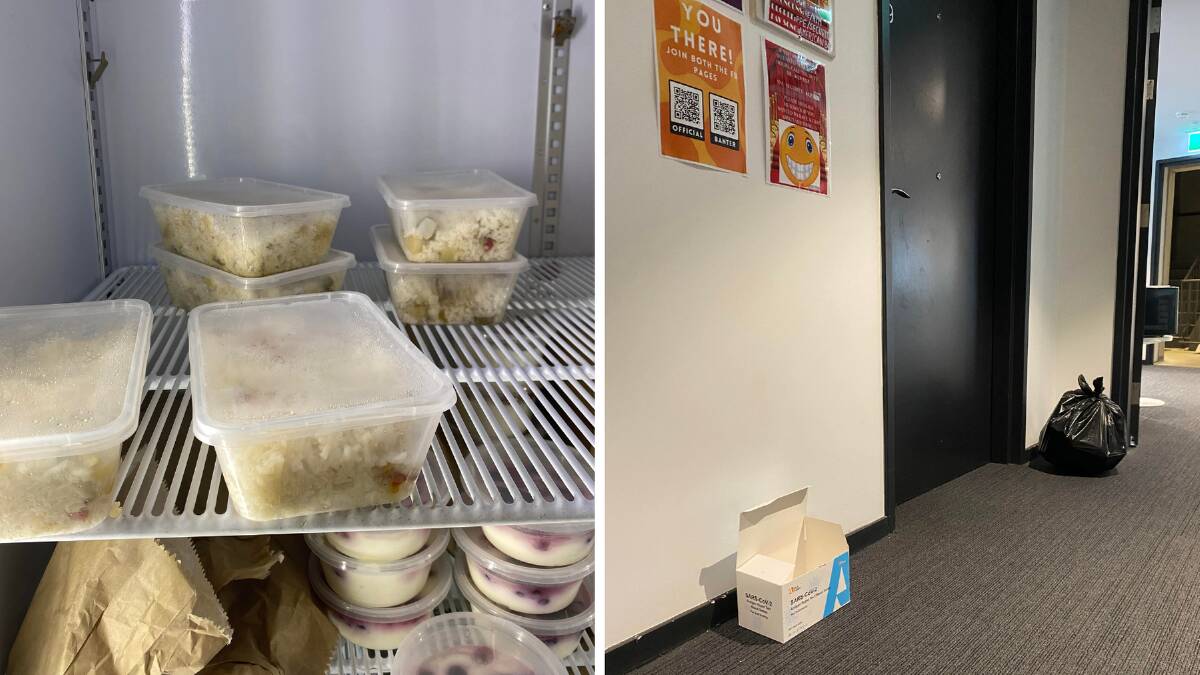
COVID-positive students at the Australian National University residential halls are struggling to get meals delivered and have their rubbish disposed of as the number of cases on campus continues to climb.
An ANU spokesman said 12 per cent of the student residents have tested positive to a rapid antigen test over the last seven days, which equates to 660 students.
The cluster has been a significant contributor to COVID-19 cases in the ACT, with the territory recording 661 new COVID-19 cases in the 24 hours to 8pm on Wednesday.
ANU staff have been asked to volunteer to deliver meals and essentials to students isolating on campus as staff and senior residents in the halls are stretched to capacity.
Wamburun Hall senior resident Charlotte Carnes said there was confusion over the meal delivery process at her self-catered hall.
On Tuesday she was told isolating students had received dinner at the same time as lunch only to get calls and texts at dinner time asking when meals would be delivered. Students got pizza and fried rice by 9.30pm.
Students with COVID have dedicated bathrooms to use. Many are leaving rubbish bags with their waste in the corridors as it is unclear how the contaminated rubbish should be dealt with.
Miss Carnes had also received reports of some infected students having conversations with others in their doorways.
"People are concerned for their safety and it's not my job to police that. My primary role is pastoral care, not rule enforcement."
Students fear the ANU management was not prepared for such a rapid escalation in numbers, propelled by O-Week social activities on and off campus.
Residential colleges were instructed to cancel any social or sporting activities this week until at least Sunday.
The ANU Students Association has had reports of quarantining students struggling to find spaces in online classes and that some rooms are not well equipped to record classes for students studying remotely.
The association's vice president Chido Nyakuengama said COVID anxiety was rife in the students who were yet to have a normal university experience.
"This uncertainty is especially difficult for first-year students who have just moved away from their home state or country to be on campus at ANU," she said.
"This means moving away from their support networks and may well be the very first time in their lives without a carer when they are unwell or in distress."
An ANU spokesman said students who live in multi-share apartments with a positive case were considered household contacts.
"We remain confident that we have the processes, support and people in place to care for any resident who is COVID positive as well as ensure everyone in our community can safely enjoy the ANU campus experience in 2022," he said.
An ACT Health spokesperson said no additional public health social measures were being considered at this time in light of the ANU outbreak.
"ACT Health is providing advice to support arrangements that balance the wellbeing of residents in isolation (who need to safely access shared facilities) while minimising risk of exposure to other residents."
Some COVID-19 cases were moved to the ACT Health-managed quarantine facility on the ANU campus last weekend.
Chief Minister Andrew Barr said the recent spike in cases was "very strongly driven" by positive rapid tests in ANU residences.
He said the super spreaders over the past two years had been younger people aged under 40 and urged people to get their booster shot.
- with Hannah Neale







